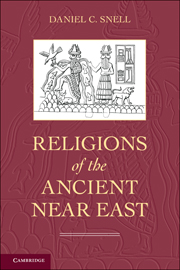Book contents
- Frontmatter
- Contents
- Figures and Maps
- Preface
- Acknowledgments
- 1 Defining Time and Space
- 2 Early Inklings
- 3 Gods, Gods, Gods
- 4 Cities, States, and Gods
- 5 The Lure of Egypt, 4000–1400 BCE
- 6 The Gods of Egypt
- 7 The Akhenaten Dream, 1350–1300 BCE
- 8 Practice in Egypt
- 9 The International Age, 1400–1000 BCE
- 10 Gods and People
- 11 The Lord Is One – Israel in Its Environment
- 12 The Turning
- 13 The Good God and the Bad God
- 14 The Lands of Baal
- 15 Greece, Etruria, Rome, and Conveying Traditions
- 16 The Dead Hand of the Past and the Living God
- 17 Experiencing Ancient Near Eastern Religion
- References
- Index
9 - The International Age, 1400–1000 BCE
Published online by Cambridge University Press: 05 June 2012
- Frontmatter
- Contents
- Figures and Maps
- Preface
- Acknowledgments
- 1 Defining Time and Space
- 2 Early Inklings
- 3 Gods, Gods, Gods
- 4 Cities, States, and Gods
- 5 The Lure of Egypt, 4000–1400 BCE
- 6 The Gods of Egypt
- 7 The Akhenaten Dream, 1350–1300 BCE
- 8 Practice in Egypt
- 9 The International Age, 1400–1000 BCE
- 10 Gods and People
- 11 The Lord Is One – Israel in Its Environment
- 12 The Turning
- 13 The Good God and the Bad God
- 14 The Lands of Baal
- 15 Greece, Etruria, Rome, and Conveying Traditions
- 16 The Dead Hand of the Past and the Living God
- 17 Experiencing Ancient Near Eastern Religion
- References
- Index
Summary
If religion was a thing we all could buy, the rich would live and the poor would die.
– Wolfgang Mieder, ed., A Dictionary of American Proverbs, 1992: 503 item 5The princess had traveled months from southern Babylonia, mostly by cart, sometimes by river barge. She had had the choice of a sea voyage from Byblos, and because she had never been on the sea, she chose that. Now it was seeming like a bad idea. She had been nauseated by the tossing and turning on the sea, and one of her slave girls had died and simply been tossed into the deep. She had wept for days, between fits of nausea.
Her chaperone, an old crone who had once been married to an Egyptian and spoke that language, had been very concerned. Now that they were gliding up the placid Nile on the way to the capital, she was barking orders to the slaves to make the princess presentable. She did not feel very presentable. She had left almost everything behind just because her father had made an alliance with this odd and distant land, and she was the token of it. Her sisters had been married off closer to home, but she was the pretty one, and Daddy wanted to make an impression. She did not feel pretty now, but she put on the eye makeup the Egyptians were said to like and dressed in her best gown. An Egyptian chaperone had joined the party as they came into the river, and she was babbling with the Babylonian one about what they should do with her hair. The princess did not care. She just wanted a bed that did not rock back and forth and maybe some food that was recognizable, onions with fish maybe. Surely there must be some onions with fish in this supposedly rich land.
- Type
- Chapter
- Information
- Religions of the Ancient Near East , pp. 84 - 94Publisher: Cambridge University PressPrint publication year: 2010



